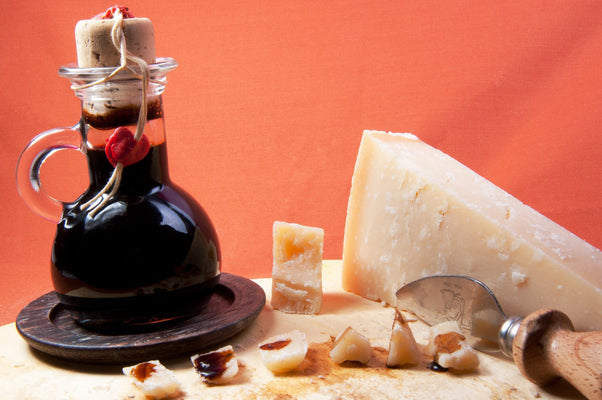The same country that gave you remarkable artists like Michelangelo and Leonardo da Vinci also presents another culinary artistry with unmatched quality and flavour, just like parmesan cheese - the incredibly versatile balsamic vinegar.
Balsamic vinegar is one of the finest vinegar out there. It is mainly called "black gold". It has a distinctive acidic and sour taste. Vinegar has been used in kitchens for over a thousand years now. They are perfect for salads giving a unique flavour to fruit and pastries.
This gorgeous product pairs well with various foods and can bring a ton of flavour to your food. In this article, we'll be explaining all you need to know about balsamic vinegar.
So whether you're curious about the ingredients, production process, or mere applications of balsamic vinegar - this article is for you!
Source of balsamic vinegar
Balsamic acid, an Italian special like parmesan cheese, is created from vines in Reggio Emilia and Modena districts.
Grapes are the essential ingredients used. Trebbiano for red wine and Spergola for white sauvignon are two varieties of sweet grapes used to make balsamic vinegar. Over an open flame, the grapes are simmered in copper cauldrons until the water content is decreased by more than 50%.
An older balsamic vinegar is added to the resulting "must" in oak barrels to help with acetification. Every year, vinegar is moved to various wood barrels so that it might absorb some of the tastes of the different kinds of wood.
The top-tier balsamic vinegar is produced solely from grapes, but the cheaper ones come from a blend of grape and wine vinegar.
This composition has led to the classification of varieties of balsamic vinegar using the leaf classification. For example, a bottle may have 1, 2, 3, or 4 leaves; The more leaves it contains, the higher its originality and quality.
This results in progressively less added wine vinegar, better-quality ingredients, and longer ageing. Balsamic vinegar boasts no additional elements while preparing their classic bottles of vinegar.

Process of making balsamic vinegar
Balsamic vinegar is produced using certain microorganisms, and the process involved is known as fermentation. This is a chemical and physical process capable of removing all traces of alcohol from the vinegar.
Grape juice is obtained from these fine grapes and cooked to make grape must. This process gives a minimum sugar level of thirty per cent while preventing the fermentation of grape juice into wine.
Some other (Mâlikita) school of thought considers this process unlawful and done primarily by people of the book who don't think wine consumption haram. But once done, you are free to drink it!
Is balsamic vinegar halal?
When deciding the halal status of vinegar, the raw materials and manufacturing process are the primary determinants. Generally, the consumption of wine and alcohol is against Islamic laws.
But when it comes to wines, there are varying points of view. While some Islamic schools consider it halal, a few others disagree. Vinegar is halal when it;
No treatment or addition
Most schools agree that wine can be used and consumed if it turns vinegar. No treatment is involved. It is halal and fit for Muslim consumption. But once tampered with or acted, it becomes haram!
While the addition of substances is unacceptable, exposure to sunlight is debatable as some schools permit this, but a few still need to. So it could be considered halal or haram, depending on your Islamic school.
Many benefits
Wine is famous for having a lot of favourable qualities. However, therapeutic qualities and nutritional merits are only the two most common.
Subjecting wines to a deliberate process to make them into vinegar rids all bad attributes while preserving the good ones. Hence, It is considered halal, provided no impure substance is present.
The consumption of vinegar by the holy Prophet (SAW)
Various hadiths confirm that the Prophet (SAW) consumed vinegar. He even spoke favourably about it and commended it.
The holy Prophet (SAW) came across a family with only vinegar as its condiments, and he hailed it a fantastic condiment and consumed it. Anything consumed by the holy prophet(SAW) is considered halal. This explains why seafood like sharks is halal.
No intoxication effect
Balsamic vinegar is considered halal because it has zero intoxication effect. A condiment's halal or haram status depends on how much alcohol it contains. Anything that makes you feel drunk is forbidden.
On the other hand, it could be halal if it has a tiny amount of alcohol. Intoxication is haram, as it could lead to prohibited behaviour and affect decision-making.

Conclusion
Balsamic vinegar is an old goody bottle with remarkable taste, diverse use and debatable halal status. While most of the Islamic schools of thought consider vinegar halal, it is crucial to be sure the balsamic vinegar you're drinking is haram-free!
For better options, look up the Chewwies marketplace.


